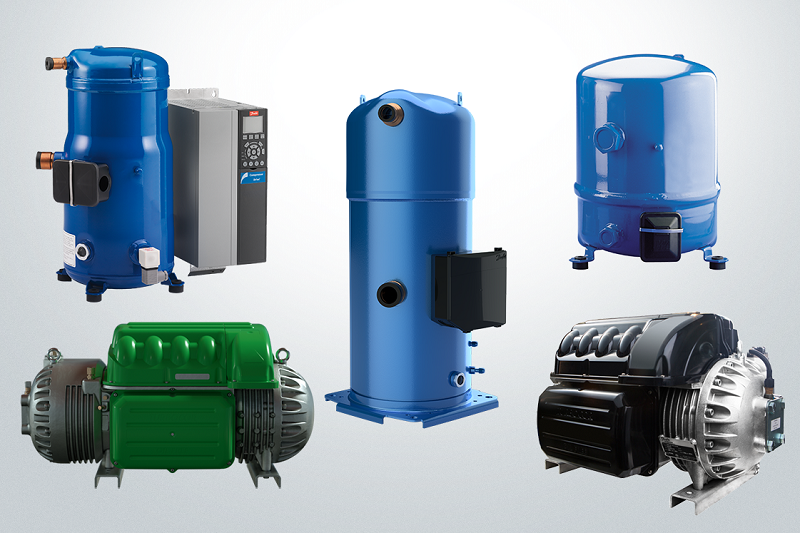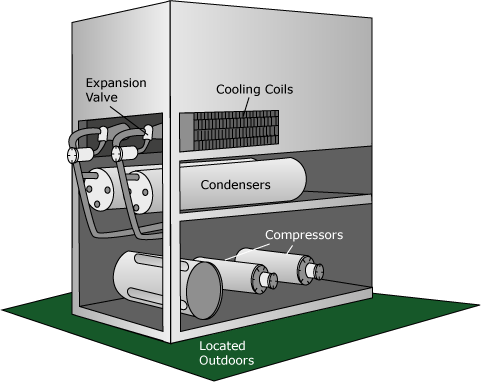There are five main types of compressors used in HVAC systems: rotary, scroll, screw, reciprocating, and centrifugal. Each type compresses gas or liquid with moving parts like pistons or impellers.
In air conditioning systems, rotary screw, vane, and reciprocating compressors are commonly found in small to medium-sized industries. Among these, screw compressors are known for their reliability and efficiency, while rotary compressors are preferred for their quiet operation and minimal vibration.
Reciprocating compressors, on the other hand, work by moving pistons up and down in a cylinder to compress air, similar to an engine. Each compressor type has its own advantages and applications in HVAC systems.

Credit: www.edrawsoft.com
Understanding Hvac Compressor Types
HVAC systems utilize various compressor types, including reciprocating, scroll, rotary, screw, and centrifugal compressors. These types differ in their mechanisms and applications, offering unique advantages for specific HVAC requirements. Understanding the differences in HVAC compressor types is crucial for ensuring efficient and effective air conditioning and refrigeration systems.
Introduction To Compressors
An HVAC system’s compressor is a crucial component that plays a key role in maintaining indoor comfort levels. Compressors are responsible for pressurizing the refrigerant to facilitate heat exchange, allowing for efficient cooling or heating of a space.
Function And Characteristics
Compressors in HVAC systems serve a vital function by compressing refrigerant gases, enabling the transfer of heat and ensuring optimal temperature regulation. Each compressor type possesses unique characteristics that impact performance and efficiency.
Drive Types
- Reciprocating compressor
- Rotary Scroll Compressor
- Centrifugal compressor
- Positive Displacement Type
- Screw compressor
The reciprocating compressor and rotary scroll compressor are among the widely used drive types in HVAC systems due to their efficiency and reliability.
Compressor Classification
Compressors can be classified into several types based on their operation and design. Understanding these classifications helps in selecting the most suitable compressor for specific HVAC requirements.
Compressor Types
There are primary types of compressors used in HVAC systems, including:
- Rotary compressor
- Scroll compressor
- Screw compressor
- Reciprocating compressor
- Centrifugal compressor
Each type of compressor offers distinct advantages and is chosen based on factors such as system size, efficiency, and noise levels.
Types Of Hvac Compressors
When it comes to HVAC systems, the compressor plays a vital role in the cooling process. There are various types of HVAC compressors used in air conditioning systems, each with its unique features and advantages.
Reciprocating Compressors
- Reciprocating compressors utilize a piston to compress the refrigerant gas.
- They are commonly used in small to medium-sized air conditioning systems.
Rotary Compressors
- Rotary compressors operate using a rotating mechanism to compress the refrigerant.
- They are known for their quiet operation and compact design.
Scroll Compressors
- Scroll compressors use two interleaving scrolls to compress the refrigerant.
- They are efficient and reliable, often used in residential HVAC systems.
Screw Compressors
- Screw compressors are highly reliable and efficient but more suitable for larger applications due to their cost.
- They are known for their high capacity and low vibration levels.
Centrifugal Compressors
- Centrifugal compressors utilize a rotating impeller to compress the refrigerant gas.
- They are often used in commercial and industrial HVAC systems due to their high capacity.
Comparison Of Compressor Types
HVAC compressor types include reciprocating, rotary, scroll, screw, and centrifugal compressors. Each type operates uniquely but shares the principle of gas compression using pistons or impellers. Rotary compressors are known for low noise and efficient operation, while screw compressors offer high reliability for larger applications.
Operating Principles
Air conditioning systems use various types of compressors to efficiently cool or heat a space. Each compressor type operates on distinct principles, influencing their applications and performances.
Advantages And Disadvantages
Each compressor type presents unique advantages and disadvantages in terms of efficiency, noise levels, cost, and maintenance requirements. Understanding these factors is crucial for selecting the most suitable compressor for a specific HVAC system.
Selecting The Right Compressor
When it comes to selecting the right compressor for your HVAC system, there are several considerations to keep in mind. Each type of compressor has its own unique features and benefits, so it’s important to understand your specific needs and requirements before making a decision.
Considerations For Ac Systems
When choosing a compressor for an AC system, it’s important to consider factors such as cooling capacity, efficiency, noise level, and durability. Here are some key points to keep in mind:
- Cooling Capacity: Different compressors have different cooling capacities, so it’s important to choose one that can meet the cooling demands of your space. Consider factors such as room size, insulation, and climate when determining the required cooling capacity.
- Efficiency: Look for compressors that are energy-efficient to help reduce your energy consumption and lower your utility bills. Scroll compressors, for example, are known for their high efficiency and are often recommended for residential AC systems.
- Noise Level: If noise is a concern for you, consider compressors that are designed to operate quietly. Rotary compressors are known for their low noise levels and are a popular choice for noise-sensitive environments.
- Durability: Choose a compressor that is durable and can withstand the demands of your AC system. Look for features such as high-quality construction and reliable components to ensure longevity.
Common Applications
The type of compressor you choose will also depend on the specific application. Here are some common applications for different compressor types:
| Compressor Type | Common Applications |
|---|---|
| Scroll Compressor | Residential and commercial AC systems, heat pumps |
| Reciprocating Compressor | Window AC units, small refrigeration systems |
| Screw Compressor | Large industrial AC systems, refrigeration plants |
| Centrifugal Compressor | Large-scale HVAC systems, industrial processes |
By considering the specific requirements of your AC system and the intended application, you can make an informed decision when selecting the right compressor. Remember to take into account factors such as cooling capacity, efficiency, noise level, and durability to ensure optimal performance and longevity of your HVAC system.
Future Trends In Hvac Compressors
The HVAC industry is constantly evolving to meet the demands of sustainability and energy efficiency. As technology advances, new trends in HVAC compressors are emerging to address these priorities. In this article, we will explore some of the key future trends in HVAC compressors that are shaping the industry.
Emerging Technologies
One of the most significant trends in HVAC compressors is the development of emerging technologies. These advancements aim to improve efficiency, reduce energy consumption, and enhance overall performance. Some notable emerging technologies in HVAC compressors include:
- Variable Speed Compressors: These compressors adjust their operating speed based on the cooling load, resulting in better energy efficiency and reduced wear on the system.
- Inverter Technology: By incorporating inverters, HVAC compressors can operate at variable speeds and optimize energy consumption.
- Magnetic Bearings: Magnetic bearings eliminate the need for lubrication and reduce energy loss, resulting in a more efficient and environmentally friendly compressor.
Sustainability Initiatives
Another important trend in HVAC compressors is the focus on sustainability and environmental impact. With increasing concerns about climate change and energy consumption, HVAC systems are being designed to meet strict environmental standards. Some sustainability initiatives in HVAC compressors include:
- Use of Environmentally Friendly Refrigerants: HVAC compressors are transitioning away from harmful refrigerants such as R-22 and adopting more environmentally friendly alternatives like R-410A.
- Energy Recovery Systems: These systems capture and reuse waste heat from the compressor to provide hot water or heat other parts of the building, improving overall energy efficiency.
- Smart Controls and Energy Management Systems: By integrating intelligent controls and energy management systems, HVAC compressors can optimize their performance and reduce energy consumption.
In conclusion, the future of HVAC compressors lies in the development of emerging technologies and sustainability initiatives. As the industry continues to prioritize energy efficiency and environmental impact, HVAC compressors are evolving to meet these demands. By embracing these trends, we can create more sustainable and efficient HVAC systems for a greener future.

Credit: www.danfoss.com

Credit: www.aircoheating.ca
Frequently Asked Questions For Hvac Compressor Types
How Many Types Of Compressors Are There In Hvac?
There are five types of compressors in HVAC systems: rotary, scroll, screw, reciprocating, and centrifugal. Each type operates by compressing gas or liquid with moving parts like piston or impeller.
What Are The 3 Types Of Compressors?
The three types of compressors are rotary, reciprocating, and centrifugal. Each type has unique features but operates by compressing gas or liquid with moving parts such as a piston or impeller. These compressors are commonly used in HVAC systems for air conditioning and refrigeration.
What Is The Best Type Of Ac Compressor?
There are five types of AC compressors commonly used: rotary, scroll, screw, reciprocating, and centrifugal. The best type depends on factors like cost-effectiveness, operating noise, and vibration. Screw compressors are reliable and efficient but not ideal for smaller applications. Rotary compressors are quieter and have a smaller footprint.
Reciprocating compressors are commonly found in residential AC units.
What Is The Most Common Type Of Compressor Found In Residential A C Units?
The most common type of compressor found in residential AC units is the reciprocating compressor. It works by using a piston to compress air in a cylinder, similar to an engine in a vehicle.
Conclusion
Understanding the different types of HVAC compressors is essential for choosing the right one for your system. Whether it’s a screw, centrifugal, rotary, scroll, or reciprocating compressor, each has its advantages and operates on similar principles. Consider the specific needs of your HVAC system when selecting the most suitable compressor type.

